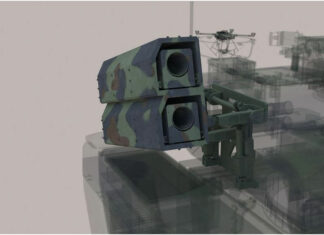White Sands Missile Range, New Mexico: Lockheed Martin successfully tested today the long-range missile designed for the Army’s Precision Strike Missile (PrSM) program. It was the third and final flight demonstration the company delivered as part of the program’s Technology Maturation and Risk Reduction phase. Previous flights were tested in March and December last year were also successful.
PrSM was fired from Lockheed Martin’s High Mobility Artillery Rocket System (HIMARS) launcher and flew approximately 85 kilometers to the target area, culminating in a highly accurate and lethal warhead event. On previous tests the missile flew 270 and 180 km. PrSM is designed for a minimum range of 60 km and a maximum range of “exceeding 499” km.
“Today’s PrSM test, a highly stressful short-range shot, represents the third successful flight test proving the effectiveness, survivability, and reliability of the tactical baseline missile,” said Gaylia Campbell, vice president of Precision Fires and Combat Maneuver Systems at Lockheed Martin Missiles and Fire Control. “We’ve validated the design and performance of our baseline tactical missile and are already working with our Army partner on Engineering Design Testing, production readiness and fielding requirements to support the future needs of the Soldier,” Campbell said.
This range was limited by the now-collapsed American-Russian Intermediate-Range Nuclear Forces Treaty (INF). As the 500 km range is now irrelevant, as PrSM is deployed in 2023 it will be able to reach 550 km. As the missile employs an open architecture and modular design, it is expected to improve in the future, extending the range to 750 km. With this potential reach, PrSM will become an important part of the Army’s future multi-domain capability. A maximum range is expected to be part of an upcoming test. Other enhancements will include the integration of a multi-mode seeker, enabling the missile to engage moving and relocated targets.
 Test objectives included confirming flight trajectory, range, and accuracy from launch to warhead event, as well as warhead lethality, HIMARS launcher integration, and overall missile performance.
Test objectives included confirming flight trajectory, range, and accuracy from launch to warhead event, as well as warhead lethality, HIMARS launcher integration, and overall missile performance.
Last month, the company was selected by the Army to move to the next phase and continue the maturation of the next-generation long-range precision fires solution for the U.S. Army.
PrSM will deliver enhanced capabilities for attacking, neutralizing, suppressing and destroying targets at depth on the battlefield and gives field artillery units a new long-range capability while supporting brigade, division, corps, Army, theater, Joint and Coalition forces.
The program now enters a 14-month technology maturation risk reduction phase that will lead to the delivery of 30 missiles by late 2023 under an urgent material release. The total request is in excess of 2,400 missiles.
PrSM is designed to replace the ATACMS missile, fielding with HIMARS and M270 rocket and missile launch platforms, carrying two PrSM rounds per launch pod.




















